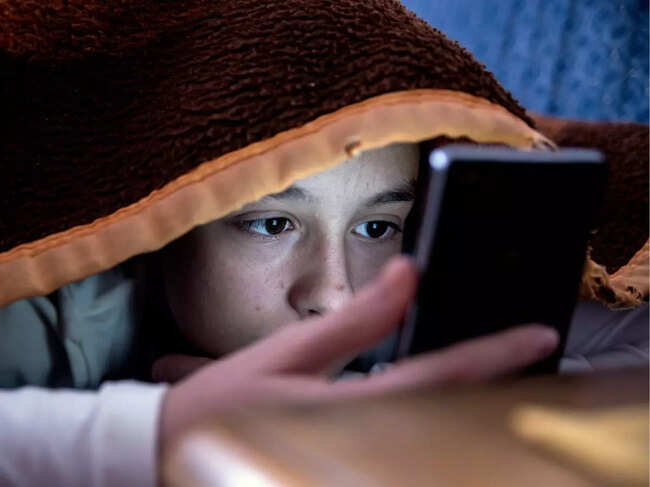Impact of Doomscrolling on Teen Brains and Mental Health
Scientists have revealed that excessive passive scrolling, known as doomscrolling, is severely impacting teenage mental health. Teens glued to screens for over two hours daily showed dramatic increases in anxiety, depression, and impulsivity. Nearly half of the teens studied required medical evaluation despite no prior issues. Researchers urge parents to limit screen time and promote physical activity to protect developing adolescent brains.

Image courtesy of The Economic Times
A study published after a nine-month-long research involving 580 adolescents revealed that teens spending more than two hours a day scrolling on phones or tablets doubled their risk of developing anxiety and quadrupled their risk of depression. The research team, led by Professor Emma Duerden, focused on adolescents aged 12 to 17 with no prior mental health diagnoses. By the end of the study, 45% of participants displayed psychiatric symptoms significant enough to warrant further medical evaluation.
"This is really surprising," said Prof Duerden. "Before COVID-19, rates of anxiety in adolescents were between 8 and 15 percent. Now, we see almost half of the sample reporting heightened anxiety, which is alarming." The study tracked the type of screen engagement, finding that passive scrolling had the most detrimental effect on mental well-being.
This alarming trend coincides with a worsening youth mental health crisis. NHS data from the UK indicated that over 20% of children aged 8 to 16 had a probable mental health disorder in 2023, up from 13% in 2017. Limiting screen time to under two hours daily while encouraging physical activity is among the most effective strategies to support adolescent well-being.
The Neurobiological Effects of Social Media
Social media platforms are designed to hijack our brain’s reward system, leading to constant dopamine hits. This ongoing stimulation fragments attention, reshapes behavior, and can result in burnout, anxiety, and addiction, especially in developing brains.
Jonathan Haidt, a social psychologist, elaborates on the mental health crisis among teens, indicating that the rapid shift toward smartphone use and social media engagement has created a "great rewiring of childhood." Children previously engaged in physical play and social interactions are now spending significant time on their devices, leading to increased feelings of loneliness and depression.
According to a 2023 study published in JAMA Network Open, individuals spending more than three hours per day on social media are twice as likely to experience symptoms of depression and anxiety compared to those who use it for less than an hour. A Pew Research Center survey found that 64% of Americans reported feeling overwhelmed by the news consumed online, contributing to heightened stress levels.
Strategies to Combat the Negative Effects
To mitigate the adverse effects of social media, several strategies can be implemented:
Set Time Limits: Most smartphones now have built-in screen time tracking features that allow users to set daily time limits on social media apps. Research suggests that limiting social media use to 30 minutes per day can significantly reduce feelings of depression and anxiety.
Curate Your Feed: Users should unfollow accounts that promote unrealistic lifestyles or distressing news. Instead, following uplifting and motivational accounts can create a more positive online experience.
Mindful Scrolling: Being aware of one’s emotions while using social media is crucial. If certain posts or articles trigger negative emotions, taking a break can help prevent a downward spiral into depressive thoughts.
Get Offline: Engaging in outdoor activities, exercise, reading, or face-to-face interactions with friends and family can enhance mental well-being. Studies indicate that replacing just one hour of social media use with an outdoor activity can significantly boost mood.

Image courtesy of Hickory Network
Awareness and proactive strategies are essential to create a healthier relationship with social media, thus protecting mental well-being amidst the challenges posed by digital connectivity.
If social media use is causing stress, anxiety, or depression, seeking professional support can provide guidance and coping strategies.





